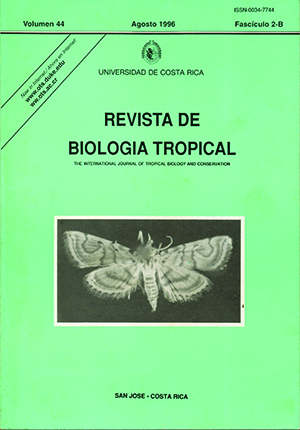Abstract
Adult emergence in Scarabaeidae followed three patterns in relation to rainfall: unimodal patterns coupled with the first (Phyllophaga spp., A. probo inconstans, A. vanpatteni, Pelidnota costaricensis, and Diplotaxis sp.) or the second rainfall peak (Anomala sp.), and a bimodal one, coupled with both rainfall peaks (A. discoidalis, and A. probo cincta). Almost all emergence characteristics were similar in Phyllophaga spp., which suggests that for triggering emergen ce, the initial amount of rainfall should coincide with a particular moment in the development of the insect. Meanwhile, Anomala spp. were more flexible in responding to rainfal!. This paper explores several hypotheses about rainfalI action mechanisms. Wolda's stability indexes in Diplotaxis sp., Anomala spp. and Phyllophaga spp. were higher than those previously calculated for any other tropical insect species.Comments

This work is licensed under a Creative Commons Attribution 4.0 International License.
Copyright (c) 1996 Revista de Biología Tropical
Downloads
Download data is not yet available.


